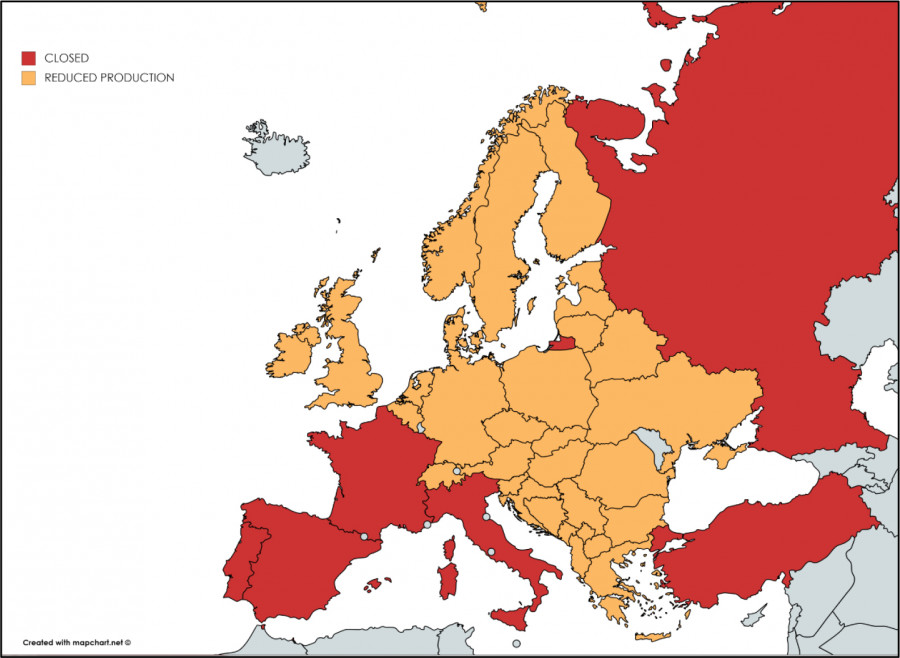
Impact of Epidemic on Flexible PU Foam Industry in Europe
BRUSSELS, BELGIUM – April 3, 2020 – According to a survey by Europur, the European Association of Flexible Polyurethane Foam Blocks Manufacturers, based on about 30 interviews with foam producers and suppliers, the production of flexible PU foam is as of 30 March 2020 heavily impacted by the present Covid-19 epidemic. The situation is expected to further worsen in April with a reduced production of between 30 % – 80 % of normal.
The association said the production of polyurethane flexible foam in Europe quickly weakened by mid-March 2020 due to a lack of demand, reduced workforce availability or government decisions. Now, at the end of March, all European foam plants that produce for the automotive industry have been closed. Foam plants which supply mainly the bedding and furniture industry have been largely closed down in Southern Europe and production has been heavily reduced in other regions. The greatest demand is still for online sales articles or medical mattresses, but is far from closing the gap for all other lost production volumes. This production stream, however, is also clogged due to shortages along the supply chain. These disruptions are anticipated to grow in the coming weeks, due to border closures, reduced workforce availability and tighter controls at border crossings, leading to delays in deliveries.
Europur also said that the situation for companies that are still producing is expected to further worsen in April. This reduction in activity might force more plants to temporarily close voluntarily even without a government order.

Impact of Covid-19 epidemic on flexible foam production in Europur member countries as of 30 March 2020. (Source: Europur)
In most countries companies can obtain some sort of support from national governments for temporary unemployment.
Europur obtained information from member companies across Europe to assess the situation in more detail. The following summarizes their findings for each region:
- Austria, Germany and Switzerland: PU foam plants are allowed to remain open but operate at much reduced capacity. Most of the PU foam produced is for special orders (e.g. medical mattresses) or online sales.
- Benelux: Production was strongly reduced since mid-March and all plants are operating at a much reduced capacity. PU foam plants can remain open provided additional precautions are taken. Most PU foam produced is for special orders or online sales.
- France: Even though there is no formal government order to do so, nearly all foam plants are currently closed due to lack of demand. However, some production for medical foams still exists.
- Greece, Balkans and Cyprus: All companies are currently operating at reduced capacity due to lack of demand. However, there is no formal government order imposing this closure. All expect the situation to worsen in April. They also currently have major logistical problems due to increased border controls and quarantine measures for incoming transport.
- Hungary, Czech Republic, Croatia, Slovakia, Slovenia: There is no formal government order imposing the closure of industries. However due to lack of demand, all companies are currently operating at much reduced capacity.
- Spain: Most foam plants are closed until 11 April 2020 following a government order to close all non-essential businesses. Some production for medical foams and online-sales still exists. Some companies, however, will remain closed through mid-May.
- Portugal: All foam plants are voluntarily closed, some plan to re-open in the second week of April.
- Italy: Foam plants are closed to protect their workers, from lack of demand and from supply chain disruptions. Some companies provide support to local initiatives to produce medical equipment.
- Poland: There is no formal government order imposing the closure of industries. However due to lower demand, especially from other European countries that usually import foam from Poland, all companies are currently operating at much reduced capacity. All expect the situation to worsen in April with some companies expecting to produce only 20 % of what they usually produce in April.
- Romania and Bulgaria: There is no formal government order for industry closure. However, due to lack of demand all companies are currently operating at very low levels.
- Turkey: Most foam plants are closed until 6 April 2020, but whether they re-open after that date is unclear.
- Scandinavia and the Baltics: There is no formal government restriction. PU foam plants remain open but operate at reduced capacity.
- United Kingdom: All plants are still open but are producing at reduced levels.
- Ireland: Foam plants are producing at reduced capacity to make foams for medical equipment.
- Russia: All plants have been closed since 28 March 2020, when the country went on a one week national paid holiday.
- Ukraine, Belarus, Kazakhstan: All plants are still open but are producing at reduced volumes.
Sourced from www.europur.org












